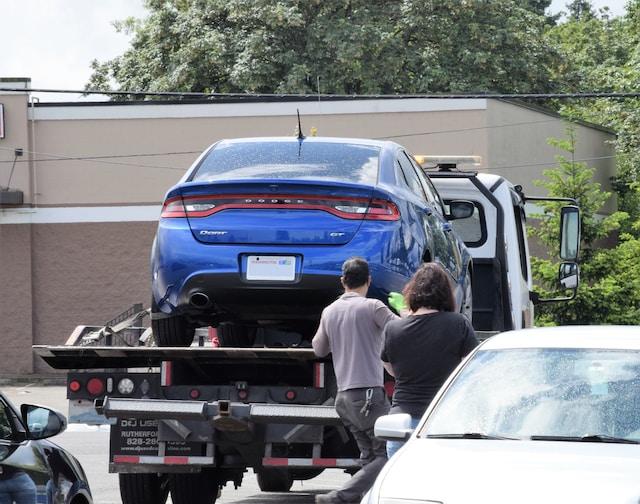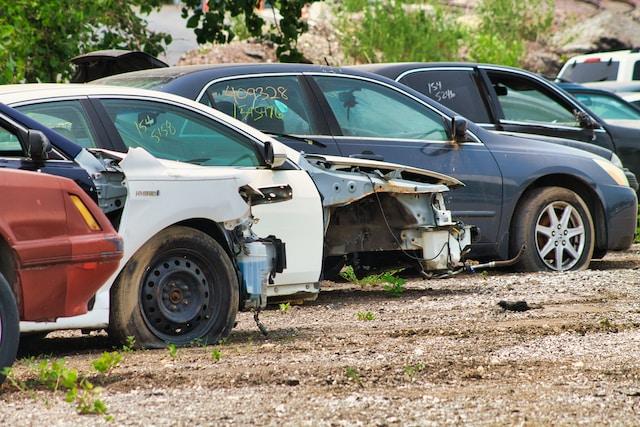What Happens If Your Car Is Impounded By Police?
Our product recommendations are made independently, but we may earn affiliate commissions if you use a link on this page.
Law enforcement has many rights if they encounter someone committing a crime. One of their abilities is to seize, tow, and impound a vehicle if it violates a specific legal stature. What happens if your car is impounded by the law?
Once your vehicle is impounded, it will remain locked away until you act to get your car back. You may be able to contact someone to get it back as soon as possible, but if it’s evidence of a crime, the police may be able to hold onto it until the verdict on the case comes through.
If you’re curious about what happens if your car is impounded by the police, read on. It’s ideal to know what happens in these situations and what you can do if you find yourself with an impounded vehicle.

What Happens If Your Car Is Impounded By Police?
If your vehicle is impounded, it will be taken there by a tow truck. Law enforcement will then place the car in an impoundment lot or tow yard, a temporary holding location for vehicles. They will sit there until further action occurs to remove them from the area.
Your vehicle can leave the impoundment lot by being:
- Picked up by you, the owner
- Stripped and torn apart for metal components
- Auctioned for the sake of the impounding agency
- Destroyed and tossed to the side
The fate of your vehicle depends on your actions and what you did to get your car impounded in the first place.
If your car faces impoundment, it’s out of your possession and will remain until your case settles or you speak with someone about the removal process. The longer you wait, the higher the risk your vehicle will be ripped apart or sold for money.
What Fees Will You Pay?
Unfortunately, there is more than a simple fine associated with having your vehicle impounded by the police. There are several fees you must pay the authorities and storage facilities associated with holding your car.
If your vehicle faces impoundment, you will pay the following fees:
- Towing and transport fees for your vehicle
- Daily storage fees for the lot
- Impound lot release fee to get the car out
- A fee if your vehicle received a boot
These will add up in time.
If you can get your vehicle out of the lot, it’s always a good idea to do it sooner rather than later. The longer you wait to remove your vehicle from the storage area, the more it will cost daily.
How Do You Get Around The Impound Fees?
When your car receives impoundment, there is often an impound fee to remove your vehicle from the lot. Sometimes this number is small, but others may find themselves faced with a price tag much higher than they can afford. To pay to get your car out of the lot, you will need to work around the impound fee.
The best way to work around the fee is to do the following:
- Speak to the impound lot about potential assistance programs or financing options
- Determine if there are any community action programs available for assistance
- Speak to loved ones, employers, or loyal friends for help
- Consider a credit card or an emergency fund
- Ask for crowdfunding assistance
There are many different ways to access financial assistance for your vehicle in this day and age.
Worst case scenario, use a credit card to pay the impound fee to remove the vehicle from the lot. It might cost you in the long run, but you will remove your car and get your life back in order sooner rather than later.

When Can Police Tow and Impound Legally?
If you have a vehicle that is towed and impounded, it might seem frustrating and sudden. However, law enforcement can complete this process legally for several reasons, from criminal acts to parking in the wrong spot. If you are liable, they reserve the right to tow and impound within the legal limits of the governing authorities.
Let’s dive deeper into the instances where police can tow and impound legally. Although it might not seem fair, they are allowed to do their job and remove vehicles if they are in the way or are partaking in a crime, or are a piece of evidence. Of course, not everything is legal for them to do - which is why it’s critical to know when they can act.
Impounding
The authorities can’t just impound your vehicle whenever they want, but there are many cases where it’s perfectly legal for them to ship your car off to a lot until you figure out how to get it back. It’s a hassle and an expensive inconvenience for you, but the police can only impound if you perform specific activities with the vehicle.
Police officers may impound your car for reasons such as if the vehicle is:
- Involved in a serious traffic offense
- Evading the authorities after committing a crime
- Driven with a suspended license
- Driven by someone without a license
- Driven under the influence
- Not insured by an approved company in the state
- Not registered in the state
- Driven carelessly, such as swerving across the center line
- Drag racing or other forms of fast, illegal, and dangerous driving
These all are rational explanations for the impoundment of your vehicle.
There is an overlap with the reasons a car might be legally towed by the local authorities. If your vehicle is in an illegal location or you are doing something unlawful with it, there is a high chance the law will impound it until they understand what is happening.
Towing
Towing is slightly different than impounding. Most of the time, tow trucks take your vehicle to an impoundment yard or tow lot. However, there are also cases where they will take it elsewhere. Like impoundment, there are only a few situations where police officers may legally tow your vehicle.
Police officers may tow your vehicle for reasons such as if the car is:
- Left in a public location where people walk like a crosswalk
- Abandoned in a public location where people walk and commute
- Used as part of criminal activity and could contain evidence
- Driver by a driver without a legal license
- Driven by a driver arrested for a DUI
- In an accident and the driver is hurt beyond ability to drive
- On a public road and is not registered
These are valid reasons for towing a car.
There are many cases where vehicles are towed and impounded unlawfully, resulting in a waste of time and money for the victim. The more aware you are of potential reasons for towing and impoundment, the better prepared you will be if you ever find yourself facing an officer who wants to tow away your vehicle.
What Is The Impoundment Procedure?
There is a simple process authorities follow when taking your vehicle. You might be present or you might be elsewhere at the start of the process.
Here is the procedure for an impoundment of your vehicle:
- An officer will pull you over if you’re driving
- A tow truck will arrive and tow the vehicle away
- The truck will bring the car to an impoundment yard or tow lot
- You will pay fees and go to court
- A plan is made to remove your vehicle from impoundment in the court of law
After these steps, you should have your vehicle back in your driveway.
Of course, every impoundment is different. If you commit a serious crime, you may never be able to do anything about your car. If you committed something less significant, act immediately to ensure you get your vehicle back with plenty of time.
How Do You Get Your Car Back After Impounding?
Getting your car back after impoundment can be a stressful process. You don’t have a vehicle, have many different fees, and might have committed a crime. There are several ways you can get your car back after the impoundment process.
Let’s talk more about the popular methods used to get cars back into the arms of their owners after impounding them. The more you know, the easier it will be to face the law enforcement officials who locked up your vehicle when the time comes for removal.
Immediate Release Request
The first way to attempt to remove your vehicle from impoundment is to enact an immediate release request. You should always go to the storage lot first and ask them to give you back your car, even if you know the authorities had the legal grounds to tow it.
It might seem pushy, but there is a reason for this action. If you don’t get it out, the police might think you abandoned your car there. From that point on, they could hit you with further storage fees and drag even more money from your pocket.
If that technique doesn’t work, there is always a legal way to release your vehicle. For this method, you must ask the court for some assistance.
Court-Ordered Release
Your second option is to request a court-ordered release. If you request your vehicle and the lot won’t hand it over because the police impounded it, ask the court for an order to remove your vehicle.
Every state has different rules regarding this procedure. They will typically release an order if the car isn’t legally impounded or if your case is taking longer than anticipated to move forward and your vehicle is necessary for your job or other life needs.

Who Pays If The Impound Isn’t Your Fault?
Typically, towing companies do not care if you were the person at fault or not. They will require you to pay the fees, which are often covered under your insurance. They will charge for the towing process and will charge more if they need to place a boot on your vehicle.
Sometimes, the local authorities or the court will pay for the impound if it’s unlawful and isn’t your fault. However, it’s rare for things like this to happen as most officers are pretty good at towing and impounding lawfully.
How Much Can A Towing Company Legally Charge?
Towing companies can be expensive, especially in a city or a small town where they essentially have a monopoly on the business. Although there have been many attempts to regulate set prices, towing companies can charge whatever they want, and the price will be legal.
Most of the time, getting towed will cost you at least $100. The average price point for a private towing company is $250, which many cannot afford. Take care and ensure you park and drive legally to avoid being towed and facing the required fees from the company.
How Do I Find My Towed Car?
Sometimes, you are there in person, watching your car get towed. If you are present, you can ask the police officer or the professional towing your vehicle where they are taking your car. From there, you can head to the lot to ask for release.
Other times, you may return to a spot where your vehicle was and find it is missing. In that case, use a towing browser online to determine where your car is and if it got towed. You might also contact the local authorities to see if they have any information.
How Long Before A Towing Company Can Sell Your Car?
If your vehicle travels to an impound facility, the towing company can sell your car after 30 days. This number might vary by state, but they typically allow a month before the lot has permission to do anything to alter or sell your vehicle.
This time frame is why it’s critical to get your car back as soon as possible. Once you find the lot, ask them to release your vehicle or contact the court for further information for release.
Reference Legal Explanations
If you use any of the definitions, information, or data presented on Legal Explanations, please copy the link or reference below to properly credit us as the reference source. Thank you!
-
<a href="https://legal-explanations.com/blog/what-happens-if-your-car-is-impounded-by-police/">What Happens If Your Car Is Impounded By Police?</a>
-
"What Happens If Your Car Is Impounded By Police?". Legal Explanations. Accessed on December 11, 2024. https://legal-explanations.com/blog/what-happens-if-your-car-is-impounded-by-police/.
-
"What Happens If Your Car Is Impounded By Police?". Legal Explanations, https://legal-explanations.com/blog/what-happens-if-your-car-is-impounded-by-police/. Accessed 11 December, 2024
-
What Happens If Your Car Is Impounded By Police?. Legal Explanations. Retrieved from https://legal-explanations.com/blog/what-happens-if-your-car-is-impounded-by-police/.